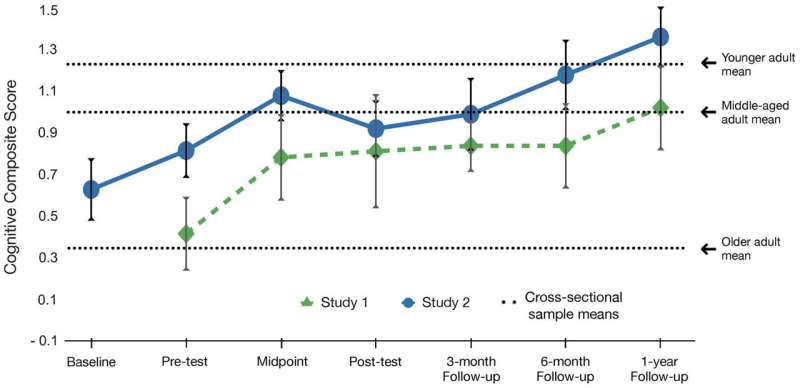This article has been reviewed according to Science X's editorial process and policies. Editors have highlighted the following attributes while ensuring the content's credibility:
fact-checked
trusted source
proofread
Older adults may achieve same cognition as undergrads, shows new study

A set of recent studies demonstrates for the first time that learning multiple new tasks carries benefits for cognition long after the learning has been completed.
The finding affirms a long-held assertion of the lead researcher, Rachel Wu, who is an associate professor of psychology at UC Riverside. That is, older adults can learn new tasks and improve their cognition in the process, if they approach learning as a child does.
"Our findings provide evidence that simultaneously learning real-world skills can lead to long-term improvements in cognition during older adulthood," Wu and her colleagues wrote in a recently published paper in the journal Aging & Mental Health. "Overall, our findings promote the benefits of lifelong learning, namely, to improve cognitive abilities in older adulthood."
One year after they learned new skills, the older research subjects tested higher for certain cognitive tasks than prior to the learning. Consistently, the scores for cognitive functions increased on average by at least two to three times, sometimes more.
The first study had six participants, the second study, 27. The median age of the study subjects was 66 and 69 years old, respectively. To qualify for the study, participants had to be at least 55 years old, fluent in English, have normal or corrected-to-normal vision, and have no prior diagnosis of a cognitive impairment. Participants in this study completed classwork and homework for approximately 15 hours a week for three months, time constraints Wu said limited the number of eligible participants.
For both studies, the participants learned at least three new skills, such as Spanish, using an iPad, photography, painting, and music composition over three months in a UC Riverside classroom for older adults. Cognitive tests were administered in a research lab before the start of the classes, halfway through the classes, and after three months of classes. There were then follow-up tests at three months, six months, and one year after the end of the classes.
"The primary goal of the follow-up assessments was to determine if gains in cognitive abilities… would continue up to one year after the intervention," the authors wrote.
The cognitive measures included attention, inhibition, and short-term memory, which requires remembering small amounts of information needed to perform tasks, such as recalling a phone number or words from a list.
The overall cognitive scores at three months, six months, and one year after the intervention were significantly higher than before the intervention, more than three times higher by many measures. In fact, the more time that passed after the learning had ceased, the higher the scores grew.
"Remarkably, the cognitive scores increased to levels similar to undergraduates taking the same cognitive tests for the first time," Wu said. "Our finding of continuous cognitive growth in older adulthood is unique because most studies show only maintenance of cognitive abilities or cognitive decline over time."
The key to the difference, Wu surmises, is learning multiple tasks simultaneously in an encouraging environment, similar to what children experience.
"The time and energy commitment to do so was similar to a full undergraduate course load," Wu and her colleagues wrote in the paper, titled "One-year cognitive outcomes from a multiple real-world skill learning intervention with older adults."
For Wu, it is further affirmation of her past research, which demonstrated that older adults can learn by emulating the learning behaviors of children. Among other things, it means older adults must approach learning with an open mind, unafraid of criticism and failure, receptive to instruction, willing to learn multiple tasks at once, and with a belief they can improve with effort.
More information: Leah Ferguson et al, One-year cognitive outcomes from a multiple real-world skill learning intervention with older adults, Aging & Mental Health (2023). DOI: 10.1080/13607863.2023.2197847



















